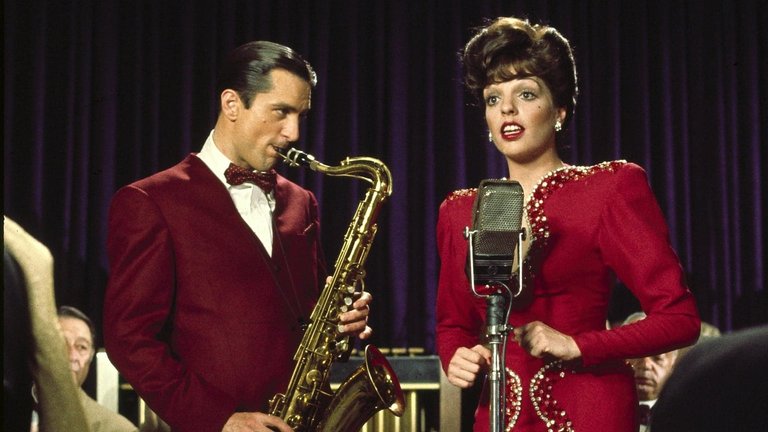Retro Film Review: New York, New York (1977)

Martin Scorsese is widely regarded as one of the greatest American film directors living today. However, his greatness should not be mistaken for infallibility. Those who remember the old days are likely aware that Scorsese has had his share of failed films in the past. One notable example is the 1977 musical drama New York, New York.
The film begins in 1945, with the Americans celebrating the end of World War II. Saxophone player Jimmy Doyle (played by Robert De Niro) tries to take advantage of the mass delirium to take aspiring singer Francine Evans (played by Liza Minnelli) to bed. Initially, Francine rejects him, but they later discover each other's talents and join the same big band that tours the country. As their band becomes successful, Francine begins to yearn for a solo career, leading to inevitable separation due to their differences in temperament and musical tastes.
Martin Scorsese envisioned New York, New York as a homage to classic 1940s and 1950s MGM musicals, which he had enjoyed watching in his formative years. He aimed to create a film with spectacular music and dance numbers, complete with fake sets and unrealistic costumes, while maintaining dark and realistic plot lines and characters that reflected the sentiments of New Hollywood, as seen in his previous films like Mean Streets, Alice Doesn't Live Here Anymore, and Taxi Driver.
The fusion of these approaches to filmmaking, symbolised by the casting of Robert De Niro, a New Hollywood icon, alongside Liza Minnelli, an accomplished singer and daughter of MGM musical icon Judy Garland, did not achieve the desired effect. De Niro's Method acting seems out of place in the film, which is better suited to the talents of Liza Minnelli. Some scenes, such as Doyle's failed seduction attempt at the beginning, are overlong, while others, like the parking dispute scene, should have been left on the cutting room floor. As a result, New York, New York often appears uneven and incoherent, which may explain why it was both a commercial and critical failure.
However, Scorsese's talent is evident in many scenes, particularly the "Happy Endings" number, which was introduced in the 1981 version of the film. Patient viewers who sit through De Niro's theatrics and the uninspired dialogue by Earl Mac Rauch and Mardik Martin are rewarded with visually and aurally pleasing scenes. The best aspect of New York, New York is the music, with the title song becoming one of the most popular pieces of music of all time. Despite the film's overall failure, Scorsese deserves praise for his musical contributions.
RATING: 5/10 (++)
(Note: Original version of the review is available here
Blog in Croatian https://draxblog.com
Blog in English https://draxreview.wordpress.com/
InLeo blog https://inleo.io/@drax.leo
Hiveonboard: https://hiveonboard.com?ref=drax
Rising Star game: https://www.risingstargame.com?referrer=drax
1Inch: https://1inch.exchange/#/r/0x83823d8CCB74F828148258BB4457642124b1328e
BTC donations: 1EWxiMiP6iiG9rger3NuUSd6HByaxQWafG
ETH donations: 0xB305F144323b99e6f8b1d66f5D7DE78B498C32A7

https://images.ecency.com/p/qjrE4yyfw5pJD9LKQ1BG3BAmr5TYaANmrJEBZ9YLLg3RSCxbA3t2GKYMAaPLkUXiTjWyJ19J6tdA13GQ7JxWz3JaisXNwA9eUmAeRgXtanhDmn9dn8yq2XpZ.webp?format=webp&mode=fit